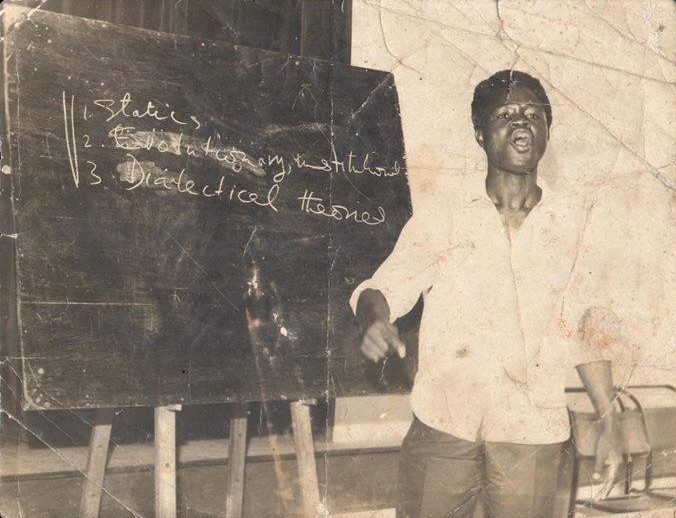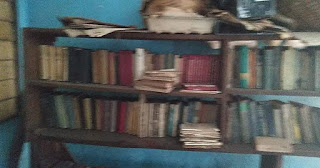Remembering Comrade Ola Oni (6/6/1933 - 22/12/1999)
Today
makes it twenty-one years since Comrade Ola Oni passed on. He was one of the
greatest leaders and teachers on the Nigerian Left, from the '60s till his
death. He, along with Eskor Toyo, Baba Omojola and others split from the
Socialist Workers and Farmers Party in Augsut 1964 (i.e., a year and four
months after SWAFP was formed) to form the Nigeria Labour Party under the
leadership of Michael Imoudu (Labour Leader #1).
Both
SWAFP and the NLP would be smashed by the military juntas (first of General
Aguinyi Ironsi's for just 6 months but more so by General Yakubu Gowon's which
lasted 9 years), as all partisan formations were repressed. But the tendency
they had formed would continue in different forms (as well as SWAFP's till the
early '90s) till the early 2000s.
With elections on the horizons for the establishment of a Second Republic in 1979, a series of two All-Nigeria Socialist Conferences were organised in 1977 and 1978, with the primary aim of forming a united socialist party. That aim was not achieved. Two parties emerged - both were never registered. And many others ended up on an entryist basis in some of the reformist parties that emerged, particularly the social-democratic UPN and GNPP and the radical reformist PRP.
The
two unregistered socialist parties were the Socialist Working People's Party (a
reincarnation of SWAFP) and the Socialist Workers, Poor Farmers and Youth Party
(simply SWP as acronym), with Ola Oni as its leader.
SWP's Labour Education and Research Centre (similar to, but with a more clearly working-class thrust than the the earlier Nigerian Academy of Arts, Science and Technology which the trend had run in the 1970s after dissolution of the NLP and into the early 1980s. Ola Oni and Baba Omojola translated the Communist Manifesto into Yoruba on the platform of the Academy, in 1982) conducted several forms of educational activities for workers.
It was also a major centre for student activists to get involved in working-class education and organising work. These included the comrades from University of Ife and The Polytechnic who would form the Trotsyist Labour Militant in the mid-1970s.
The
mid-80s did not only witness the foundations of lasting Trotstyist politics on
the Nigerian Left (an earlier effort in the 60s had floundered). It was
actually a period of reconstitution of the Nigerian socialist left.
The Marxist-Leninist Left coalesced into two groups: the Socialist Congress (SCON, or simply SC) and eventually the Socialist Revolutionary Vanguard (SRV led by Ola Oni). It is to Oni's credit that whilst the SWAFP/SWPP trend fell off the cart at this turn around an historic corner, he kept the torch of continuity of his trend alive (albeit or rather with the drawing in of new, and at that time not so new - i.e., from the 70s as where the SC leading comrades - generation).
(Comrades from the SWAFP/SWPP heritage did try to regroup at the turn of the century as a Communist Party of Nigeria (COMPON) with barely a dozen cadres. These were fine revolutionaries no doubt. They had all passed through the firm organising hand of Wahab Goodluck (the leader of the SWAFP/SWPP trend along with Ibidapo Fatogun and S.U. Bassey). But, unlike Ola Oni’s trend, they had not been able to regenerate cadreship.
The death of Ibrahim Yusuf the COMPON Chair a few years back marked what was effectively the beginning of the end for an attempt to find a new beginning for that trend. And the painful loss this year, first of AbdulKareem “Xmakad” Motajo & then Joel Emereole might have sealed this.)
The 1990s was also a defining decade. The storm of struggle after
the annulment of the “June 12” presidential election led many on the Left to
ethno-nationalist politics. This, arguably started with Yoruba comrades in the south-west
(O’odua Youth Movement, 1994; O’odua Peoples Congress, 1995; O’odua Liberation
Movement, 1996 & YOREM, 1999) and then the Niger Delta (Pan-Niger Delta
Resistance Movement – Chikoko Movement -, 1997 & Ijaw Youth Council, 1998).
Ola Oni was swept into this turn, becoming head of the Apapo
Egbe omo O’odua (Coalition of -Left- O’dua groups). In the funeral oration I
delivered on behalf of the Medical and Health Workers’ Union of Nigeria as we
paid our last respects to him, I pointed out our reservation at this. It is
however important not to take this last act in a very eventful revolutionary
life as a denouement of class politics.
For Oni as with some of those on the Left who swung to this kind
of nationalist politics, it was about addressing the national question frontally
as an important aspect of the broader social question of class politics. I don’t
agree with this.
But it is to Ola Oni’s eternal credit that, unlike many who got
rich through O’odua politics (which enabled alliances with the Yoruba bourgeois
and with it the flowing in of hundreds of millions of naira, from Ilorin and
Alausa for example), he chose not to benefit materially. One can’t deny that he
acted on a principled basis, and not one of self-aggrandisement, even as one can
equally argue that this principle could be considered flawed.
I think that turn for him represents a furtherance of entryism
raised beyond tactic to a more strategic level. He had carried out entryism in
the bourgeois social-democratic UPN when SWP was not registered, in the early
1980s.
The entrance of hundreds of thousands of people into the
struggle on a Yoruba ethnicist basis inspired many comrades in the south-west
as a to see ethno-nationalist politics as a short-cut to massifying the
movement for socialism in the long run whilst addressing the national question
in the short-term.
It was thus seen as entryism not in the traditional sense of work
in a party or organisation, but of work in the Yoruba self-determination
movement with Left organisations which then wittingly or unwittingly ended up in
class collaboration with the bourgeois. It is however telling that Ola Oni did not simply dissolve into the ethno-nationalist movement as many did, despite his leading role in Apapo. He kept the flag of SRV aloft and even sort to build a united front of the Left, the United Democratic Alliance (UDA) as an SRV project in the last years of his life.
As we remember Ola Oni today, I think great attention should be
paid to preserving his monumental legacy. His home and bookshop at 6 Odeku
Close was for several decades both home and the primary source for radical and
revolutionary literature for many, if not most of us on the Left. The house now
holds manuscripts of Baba Oni and invaluable records of meetings and movements.
His son, Tunde Oladapo Oni has tried, with the help of a few
comrades like Dr Sola “Sola Mike” Olorunyomi to preserve these, including with
digitization. But they are still not in the best of shape. A fire sometime
back has also resulted in the loss of some of these materials, while the Comrade
Ola Oni Centre for Social Research established in Osogbo when Rauf Aregbesola
was governor has not really been of much help, to the best of my knowledge.
I am strongly of the view that comrades need to take the
preservation of these materials, and indeed the wealth of materials being lost
as we lose the great minds and leaders of our movement, as a project. I would
suggest we task ourselves with work over the next four years to have this done,
toward commemorating a quarter of a century of the exit of the great teacher
and leader that Comrade Ola Oni was.
We must celebrate our s/heroes. Their labours must not be in
vain. Their legacies must be kept alive, and not just as mummified relics, but
preserved in ways and manners that help nourish the struggles of today and
generations to come, in the struggle for and building of socialism.





Comments